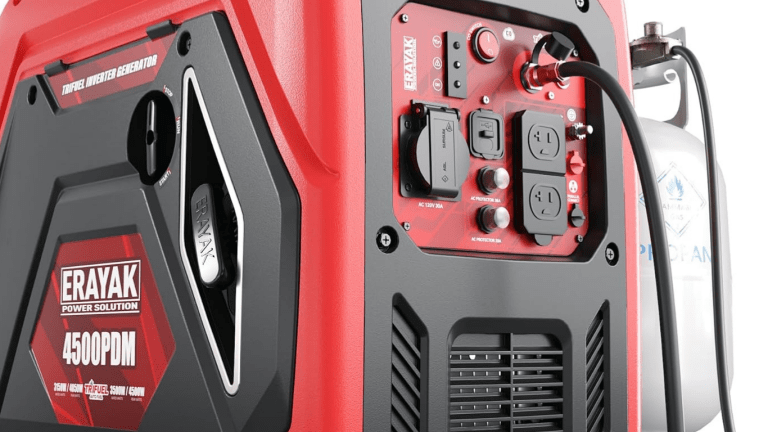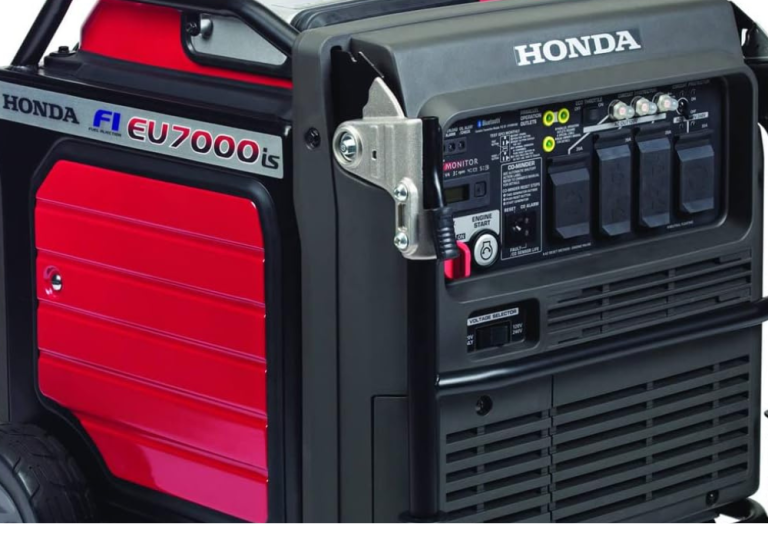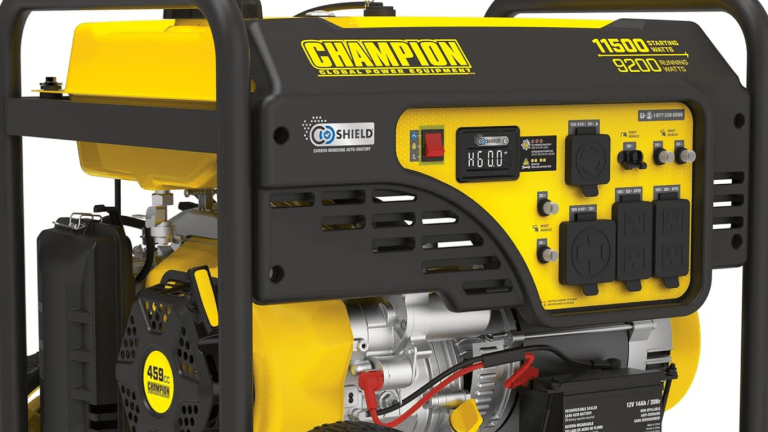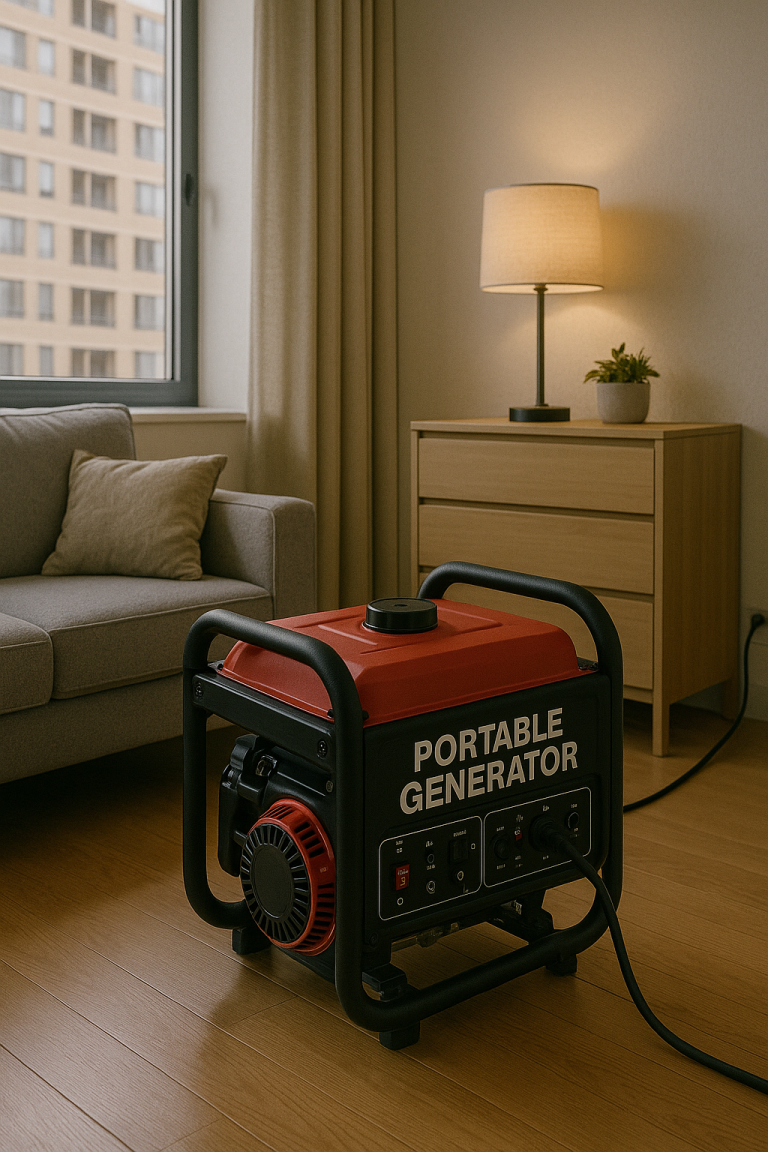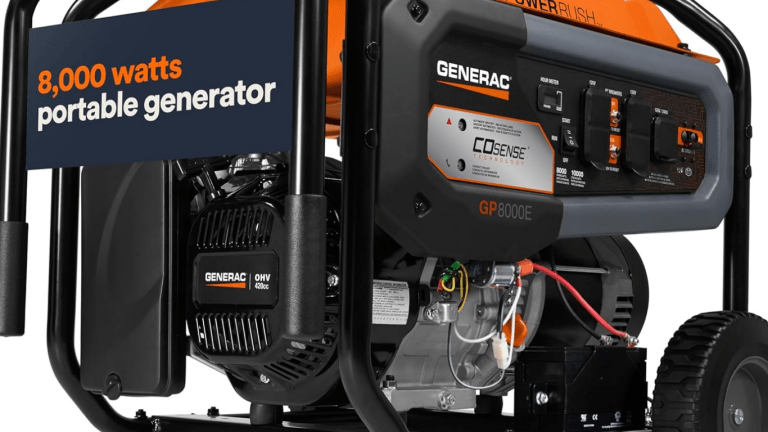Small Generator for Camping Fridge – Keep Your Food Cold Off Grid.
Ready to grab your small camping fridge now then skip the rest of the post. Don’t wait, click the link below to order yours today and start your next adventure fully prepared!

EUHOMY 12 Volt Refrigerator, 19QT(18L) Compressor Electric Cooler APP Control, Car Fridge -4℉~68℉, Portable Refrigerator 12/24V DC 110-240V AC, Portable Freezer for Camping, Travel And Boat.
Keeping your food and drinks cold while camping can be a challenge, especially during warm weather or longer trips. A camping fridge offers a convenient solution, but without access to electrical hookups, you’ll need a reliable power source. That’s where a small generator for your camping fridge comes in.
In this guide, we’ll explore what to look for in a generator to power your camping fridge, how much power you actually need, the best generator features for off grid cooling, and tips for efficient usage so your food stays safe and your generator runs smoothly.
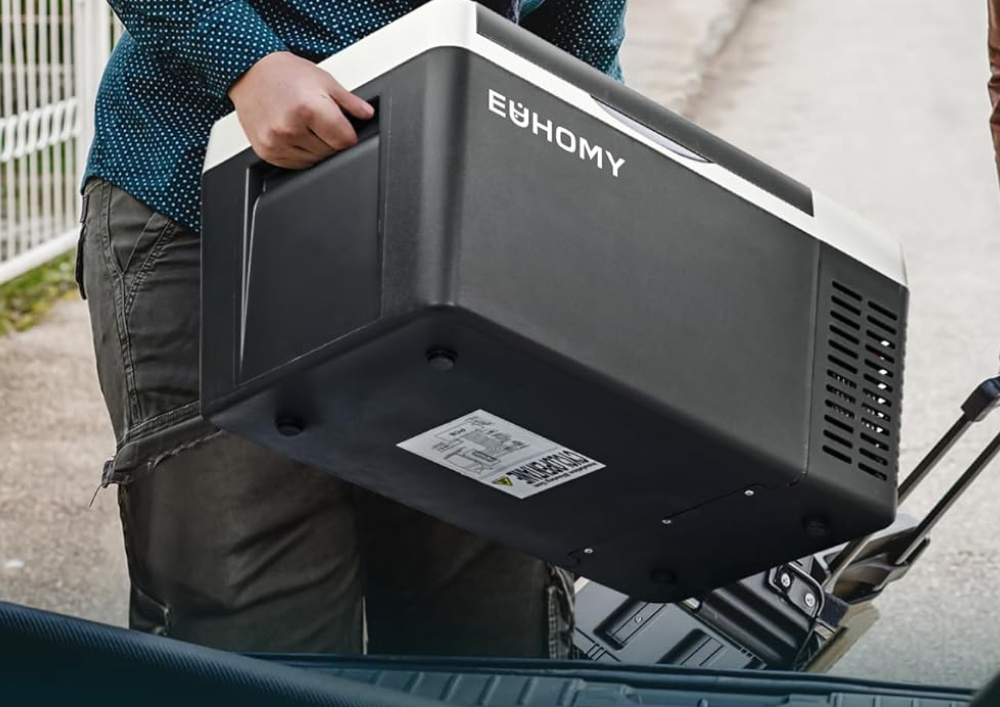
Why Use a Generator for Your Camping Fridge?
Whether you’re car camping, overlanding, or staying at a remote site, a small generator allows you to:
- Power your fridge consistently without relying on campground hookups
- Extend your trip by keeping food and drinks cold for days
- Avoid spoiled food and unnecessary waste
- Store perishable items safely, including meats, dairy, or medications
- Use your fridge during travel or at off grid base camps
While coolers with ice work for short stays, a generator + fridge setup offers greater flexibility and eliminates the need for constant ice refills.
How Much Power Does a Camping Fridge Use?
The average portable camping fridge uses between 40 to 80 watts while running. However, fridges often draw more power at startup — sometimes 2–3x their running wattage for a few seconds.
Here’s a general power usage breakdown:
| Appliance | Running Watts | Surge (Startup) Watts |
| Small 12V Fridge | 45–60 W | 100–150 W |
| Dual-Zone Fridge/Freezer | 60–80 W | 150–200 W |
Rule of thumb: Choose a generator that offers at least 300–500 watts of continuous power. This ensures it can handle both the startup load and consistent operation.
What Type of Generator Is Best for a Camping Fridge?
There are two main generator types that work well with camping fridges:
✅ Inverter Generators
- Quiet operation (under 60 dB)
- Fuel-efficient with eco mode
- Clean, stable power safe for sensitive electronics and fridges
- Lightweight and portable
These are the top choice for camping because they’re quiet, compact, and reliable.
✅ Portable Power Stations (Battery-Based)
- Silent operation with no fuel required
- Recharge via wall, car, or solar
- Ideal for short trips or eco friendly campers
- Good if your fridge is energy-efficient (like 12V compressor models)
They’re perfect for those who want zero noise or emissions and don’t need power for high-wattage appliances.
Key Features to Look for in a Generator for a Camping Fridge
Not all generators are created equal. When you’re powering a fridge outdoors, here’s what to prioritize:
🔋 Stable Power Output
Inverter generators are preferred because they produce pure sine wave electricity, which is gentle on fridges with sensitive internal electronics.
🔌 AC and 12V Outlets
If your fridge uses a standard plug, make sure the generator has AC outlets. For 12V fridges, a 12V DC outlet or USB-C PD output is a bonus.
🔇 Low Noise Levels
Choose a generator that runs under 60 dB to avoid disturbing your campsite or your sleep.
🕒 Long Runtime
Look for 6–10 hours of runtime at 25–50% load, especially if you’re using the fridge overnight.
🪶 Portability
Generators under 50 lbs with handles or wheels are ideal for moving between your vehicle and the site.
🌲 Rugged Design
A camping generator should be able to handle dirt, light rain, and uneven surfaces without damage.
Can a Small Generator Run a Fridge All Day?
Yes — if the generator has the right output and runtime, it can run your fridge all day and night.
Tips to ensure continuous operation:
- Use Eco Mode: Many inverter generators throttle power based on load, saving fuel and running more quietly.
- Monitor Fuel Levels: For gas models, always bring extra fuel. For battery stations, bring solar panels or car adapters to recharge.
- Avoid Overloading: Don’t plug too many devices into the generator along with the fridge.
Ideal Generator Wattage for Fridges + Other Camping Gear
If you plan to run more than just your fridge, consider the total wattage of all devices combined. Here’s a sample setup:
| Device | Running Watts |
| Camping Fridge | 60 W |
| LED Camp Lights | 15 W |
| Phone Charging | 10 W |
| Laptop Charging | 50 W |
| Mini Fan | 30 W |
| Total | 165 W |
In this case, a 300–500 watt generator would be ideal — providing a safety buffer and enough capacity to run all essentials.
Fuel vs Battery Generators: Which One is Better?
| Feature | Inverter Generator | Portable Power Station |
| Noise Level | Low (50–60 dB) | Silent |
| Power Duration | Long (with fuel) | Limited (unless solar-charged) |
| Weight | 30–50 lbs | 10–30 lbs |
| Eco-Friendly | Uses fuel | 100% electric |
| Recharging Options | Gas or propane | Wall, car, solar |
| Best For | All-day fridge use | Short trips, silent camping |
Verdict: If you need longer run times or plan to camp off-grid for days, go with a fuel powered inverter generator. If silence and simplicity are top priorities, go for a portable power station.
Generator Placement and Safety Tips.
Always operate generators safely and responsibly:
- 🏕️ Place at least 20 feet from your tent to reduce noise and carbon monoxide risk
- ❌ Never run a generator inside a tent or vehicle
- 🧯 Keep ventilation clear and avoid wet areas
- 🔌 Use extension cords to reach your gear while keeping the generator away from your sleeping area
- 💧 Protect with a generator tent or cover in case of rain
Best Times to Run Your Generator.
To maximize efficiency and minimize disruption:
- Run your generator during the day or early evening
- Charge your fridge battery during the day, then let it coast overnight (if your fridge supports battery operation)
- Avoid running late at night, especially at campgrounds with generator restrictions
Bonus Tips for Efficient Camping Fridge Operation.
Extend fridge runtime and reduce generator load with these simple tricks:
- ❄️ Pre-cool your fridge at home before leaving
- 🧊 Freeze food or water bottles to maintain cold temps longer
- 🌡️ Set fridge to energy-saving mode or eco temp
- 🕶️ Shade the fridge from direct sun to reduce compressor strain
- 🧼 Keep the fridge closed as much as possible to trap cold air
Final Thoughts: Choosing the Right Small Generator for Your Camping Fridge.
If you want cold food, safe storage for perishables, and comfort on your outdoor trips, a small generator for your camping fridge is a worthwhile investment.
Here’s your quick checklist:
- ✅ 300–500 watt inverter generator or power station
- ✅ Quiet (under 60 dB)
- ✅ Lightweight and portable
- ✅ Fuel-efficient or solar-rechargeable
- ✅ Safe and stable for sensitive electronics
With the right setup, your fridge stays cold, your trip stays stress-free, and you get the convenience of home in the great outdoors. Click the link below for that perfect choice.



